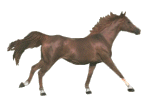| Author |
 Topic Topic  |
|
|
|
Sue J
Gold Member
   
 Wales Wales
914 Posts |
 Posted - 11 Jun 2007 : 11:20:05 AM Posted - 11 Jun 2007 : 11:20:05 AM




|
|
My older mare has always suffered from a little grease on her lower hind legs. It has never caused her a problem until I washed them too rigorously one time and she ended up with lypmphangitis. The vet said washing the legs and picking off the grease was the worse thing I could have done and best to leave it alone. My gelding has now got the same problem, no doubt transmitted from the mare. From his hocks down his lower leg and the hair seems thicker than usual and is now coming out in tufts. Again it doesn't appear to be causing him a problem. I have washed his legs gently and rinsed with very dilute t-tree oil in water, but only just started to do this so we shall wait and see if this helps. I wondered if anyone else had come across this and had any suggestions??
|
Welshpool
Welsh/Shrops border
   
|
|
Report to moderator
|
|
|
Moira
Gold Member
   

Scotland
503 Posts |
 Posted - 14 Jun 2007 : 3:14:22 PM Posted - 14 Jun 2007 : 3:14:22 PM




|
| My BWB gelding gets this too but only in winter so I always put it down to mild mud rash. The last couple of years I have used Equimins Winter Leg Scrub on him and it seems to help although he still gets the grease and his hair comes out in tufts when you rub it gently. The new hair then grows back as normal. |
  
***Zak******Zhaazeer*****Gremlin |
Report to Moderator  |
|
|
x_Kath_x
Bronze Member
 
England
164 Posts |
 Posted - 15 Jun 2007 : 11:05:03 AM Posted - 15 Jun 2007 : 11:05:03 AM




|
My Arab gelding has trouble with grease down the front of his hind legs, the middle of his face and his ears. He has sensitive skin so gets things like mud fever and rainscald really easily (but insists on living out!), doesn't grow hair back well after injuries and gets hives with most natural products like alloe vera, neem, and tea tree. The grease doesn't bother him but doesn't look attractive, my vet commented that it seemed to be a strange kind of seasonal alopecia. Although he has it all year in spring/summer it flakes away taking the hair with it in tufts.
Over the years I've tried many different things but found the best to be wait until he's sleepy and then very patiently use a very gentle rubbing motion on the grease or use a very soft face brush in gentle circular motions until it has all come out (sometimes takes days with my boy). Once the clumps of grease and hair have come out the new hair usually grows back in a few days/weeks on his legs, longer on his ears. I'd avoid scrubbing or even washing personally whilst the grease is there, anything that may break the skin is best to avoid (I find even brushing with a body brush can make him sore when he's like this). If it is raw I either puff some wound powder over the area or apply a little thin cream (got one called skin repair at the moment but forgotten the brand that I use to stop the skin on his ears drying out whilst they're hairless), thick creams tend to make the hair fallout worse.
Sorry for the long reply, I hope it helps. |
     |
Report to Moderator  |
|
|
Honeyb060674
Platinum Member
    

United Kingdom
4301 Posts |
 Posted - 15 Jun 2007 : 11:28:27 AM Posted - 15 Jun 2007 : 11:28:27 AM





|
| Interesting topic. Since Honey had rainscald last year, the hair has grown back but not as well as in other areas, and recently she's got the same greasy/scurfy patches you all described in this area. Washing and scrubbing doesn't help at all, nor does brushing really. I have to pick it out of her coat, the hair comes away in little patches and doesn't leave raw or sore skin. Found this article about Equine Lymphangitis, and it implies that its a bacterial/fungal infection that would enter through wounds?http://en.wikipedia.org/wiki/Equine_Lymphangitis |
      
Claire & Sunny x
http://sunnyandclaire.blogspot.com/ |
Report to Moderator  |
|
|
Judith S
Platinum Member
    

Wales
15686 Posts |
 Posted - 15 Jun 2007 : 11:49:44 AM Posted - 15 Jun 2007 : 11:49:44 AM





|
| Sly my grey Arab is the only one of our lot to get it - on the front of his hind cannon bones. I usually just softly brush it away - & dab on some Aloe Vera if sore. |
    |
Report to Moderator  |
|
|
arabic
Platinum Member
    

England
4562 Posts |
 Posted - 15 Jun 2007 : 2:18:31 PM Posted - 15 Jun 2007 : 2:18:31 PM




|
Freddie gets it mildly in winter and I too thought it was down to the wet weather. I treated the area the same as his heels for mudfever over the winter and it wasnt as bad.
Sandie |
Report to Moderator  |
|
|
Sue J
Gold Member
   

Wales
914 Posts |
 Posted - 18 Jun 2007 : 09:52:17 AM Posted - 18 Jun 2007 : 09:52:17 AM




|
| Thanks for all your replies. It's interesting that my mare the one I mentioned who has always suffered from the grease, (just down her back legs along the cannon bone area) also had a bit of rain scald during last winter. She has never had it before, but then she has been rugged in the past, this year due to her not working and it being so mild, I decided to leave her without. I felt really bad when I discovered the rain scald on her back. It wasn't sore at all and just brought the hair out same on her legs. |
Welshpool
Welsh/Shrops border
   
|
Report to Moderator  |
|
|
Judith S
Platinum Member
    

Wales
15686 Posts |
 Posted - 18 Jun 2007 : 10:23:22 AM Posted - 18 Jun 2007 : 10:23:22 AM





|
Yesterday I noticed Rufus has it a bit on one back cannon at the front....never had it before?
Judith |
    |
Report to Moderator  |
|
|
Sue J
Gold Member
   

Wales
914 Posts |
 Posted - 18 Jun 2007 : 12:57:59 PM Posted - 18 Jun 2007 : 12:57:59 PM




|
Meant't to add to my last message. I think the rain scald on my mare's back was due to the very mild and wet weather we had around christmas time. Although I used to bring them in early on very wet days, she had often already got wet. She was also a little fat  so had a natural gulley down her back where the water probably lay which didn't help I suppose. She will be rugged this winter, I was horrified when I saw her hair coming out so had a natural gulley down her back where the water probably lay which didn't help I suppose. She will be rugged this winter, I was horrified when I saw her hair coming out 
She has always had this bit of grease on her back legs but my gelding has never had it before, so I think it is something to do with the wet mild weather.
It's pouring down here again today  Hope it's brightens up for week end. Off to Cirencester on Friday, camping again. If it rains again all week end like at Dukeries i think I will give up the tent. Hope it's brightens up for week end. Off to Cirencester on Friday, camping again. If it rains again all week end like at Dukeries i think I will give up the tent. 
|
Welshpool
Welsh/Shrops border
   
|
Report to Moderator  |
|
| |
 Topic Topic  |
|

